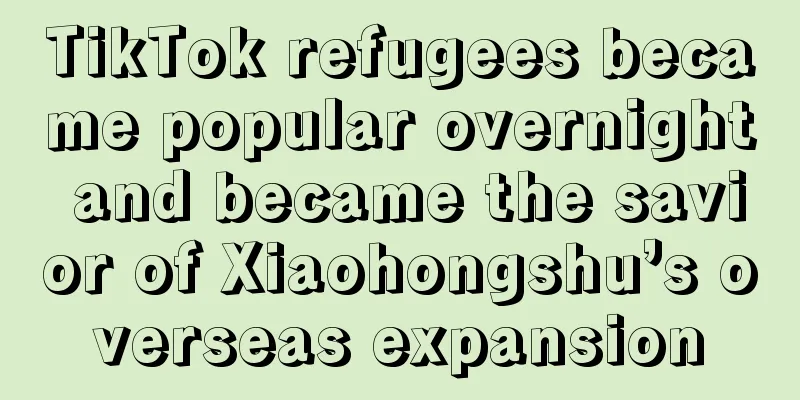TikTok refugees became popular overnight and became the savior of Xiaohongshu’s overseas expansion

In recent years, there has been a popular saying on the Internet: "Hard work is not as important as choice", but the explosion of Xiaohongshu in recent days has proved that "luck is more important than choice". On January 14, according to foreign media reports, due to the growing concerns of American users about the TikTok ban, RedNote (the international version of Xiaohongshu) quickly became popular on the American Internet and topped the Apple App Store download list, followed by TikTok's photo-sharing app Lemon8 and OpenAI's ChatGPT. (Image source: App Store) A large amount of English content appeared on the Xiaohongshu platform. Under a topic called "tiktokrefugee (TikTok refugees)", the number of notes increased from more than 2,000 to 77,000 in less than 24 hours, and the total number of views also increased from 390,000 to more than 38.58 million; Google Trends data also showed that the popularity of the keyword "RedNote" soared from 0 to 100 in 24 hours. (Rednote keyword Google search trend source: Google) The senior management team of Xiaohongshu must have been pleasantly surprised and astonished recently, “How did they succeed in going overseas so easily?” So, when luck comes, it cannot be stopped. Xiaohongshu, which has tried for many years but failed to successfully “go overseas”, never expected that one day it would be able to “win without any effort”. However, this sudden influx of traffic is not so easy to handle. It remains to be seen whether Xiaohongshu, which has repeatedly encountered setbacks in overseas markets, can seize this opportunity, take over Tik Tok's traffic and gain a firm foothold overseas. 1. It is better to win overnight than to be “unknown” overseas for many yearsWhen it comes to going overseas, Xiaohongshu can be said to have fought and failed time and time again. In the past four years, Xiaohongshu has launched six apps to further expand its international market, but the results have all been dismal:
… (Photo source: Bad review X.PIN) Although Xiaohongshu has a certain influence in overseas Chinese circles, its overseas "performance" is really unbearable to look at when facing foreign friends. The six apps combined are not as influential as Xiaohongshu itself overseas. This time, the reason why Xiaohongshu was able to usher in this wave of "huge wealth" is that US government officials have long politicized TikTok's operating issues under the pretext that "China may use TikTok to collect US user data and conduct surveillance." According to a law passed by the U.S. Congress last year, TikTok must separate from its parent company, ByteDance, by January 19, otherwise it will face a complete ban. As January 19 approaches, more and more American users are worried that TikTok may be banned and are starting to look for alternative products. Then why Xiaohongshu? On the one hand, the US government's practice of arbitrarily banning a platform and restricting speech on the grounds of protecting user data security has aroused strong resistance from the American people. Some Tiktok users said, "Since the US government is worried that our personal data will be taken away by the Chinese, then we will send it directly to the Chinese. Do you want to take away my phone?" This is also the reason why many Tiktok users did not switch to Instagram Reels, YouTube Shorts and other TikTok's competitors in the United States, but would rather spend more time and effort to register and flock to China's Xiaohongshu. On the other hand, after experiencing TikTok and China's 144-hour visa-free policy, more and more foreigners have changed their views on China and have seen through the information cocoon woven by foreign media. They are increasingly eager to see the real side of China. Using Chinese social media software is the first step to establishing a real connection. (Photo source: Xiaohongshu) What’s interesting here is that these TikTok users neither chose Tik Tok’s Chinese version Douyin nor Lemon8, which is known as the “overseas version of Xiaohongshu”, but resolutely chose Xiaohongshu. This is mainly because Douyin requires a Chinese mobile phone number to register, and its Chinese version cannot be downloaded in the US. However, Xiaohongshu supports global mobile phone number registration and is available in the US App Store with one click. Lemon8 was not selected because there is another requirement in the ban regulations passed by the US Congress that the clause of banning without divestment generally applies to applications owned or operated by ByteDance, TikTok and any of their subsidiaries. Therefore, although Lemon8 has not been explicitly included in the ban, its prospects in the United States are still full of uncertainty. In addition, it is worth mentioning that Xiaohongshu’s overnight popularity is also inseparable from the support of overseas Internet celebrities. Jen Hamilton, a TikTok influencer with 3.9 million followers, shared her plan to switch platforms in a TikTok video, saying sarcastically: "Oh, you don't want the Chinese to have access to our very sensitive personal data? I don't care at all!"; Influencer whattheish also called Xiaohongshu the Chinese version of TikTok on TikTok, and strongly urged fans to "switch" to Xiaohongshu. Dissatisfaction with the US government, curiosity about the real China, low entry barriers to the platform, and the calls from TikTok influencers have made Xiaohongshu, which has gathered "the right time, the right place, and the right people", a natural choice for American TikTok netizens. However, this does not mean that Xiaohongshu has established a firm foothold overseas. Its previous experience of going overseas many times and failing many times, as well as the rise of ByteDance's Lemon8, have exposed many problems in Xiaohongshu's overseas strategies and operations. 2. Buddhist, vacillating, and not spending money, it is difficult for content communities to succeedAs mentioned before, Xiaohongshu has launched many apps in the past few years, but most of them failed without making any splash. If it fails once or twice, it can be attributed to bad luck or product problems. But if it fails many times, the problem is probably due to Xiaohongshu's planning and operation of "going overseas". First of all, Xiaohongshu’s positioning as an overseas app is not pleasing. For a long time, Xiaohongshu's service targets have always been Chinese users, and its main overseas audience is also Chinese people, which has greatly limited Xiaohongshu's overseas ideas and experience. So we can see that whether it is a fashion community, overseas shopping, quality home furnishings, or outdoor life, beauty community, Xiaohongshu is committed to spreading high-quality and stylish lifestyles overseas. However, foreign friends may not buy into this. On foreign social platforms, foreigners generally like to take close-up videos, emphasizing authenticity and naturalness. Moreover, due to the epidemic and economic downturn, people with "no money" seem to pay more attention to the small happiness that is actually happening at the moment, compared to the beautiful life carefully created online. Looking at the more popular social apps overseas in recent years, in addition to Tik Tok, there have also been Poparazzi (anti-appearance involution), Locket Widget (close friend photo sharing), and BeReal (recording real life), which reflects that compared with refinement, overseas young users prefer authenticity. This makes the overseas apps such as Xiaohongshu, which focus on high-quality lifestyle, either have a bad start or lack of stamina. In contrast, Lemon8, owned by ByteDance, focuses its publicity on young people, lifestyle, and diversity, which is more in line with user psychology and is subjectively easier to accept. Secondly, Xiaohongshu does not invest enough resources in overseas apps. You should know that Lemon8 has "predecessors" such as TikTok, BuzzVideo, and CapCut (the overseas version of Jianying) to endorse its brand and attract traffic. In the stage of burning money to expand the user base, Lemon8 not only paid bloggers to post, but also made a lot of placements on Xiaohongshu, Instagram, and its own software TikTok, allowing various KOLs to post short videos to promote this new application. (Photo source: Japan Lemon8) On the other hand, Xiaohongshu's overseas operations seem to be quite Buddhist and "stingy". In a previous interview article by Xiaguangshe, a top blogger of Xiaohongshu who had contact with both Spark and Lemon8 teams said that Lemon8 has better creative rewards and user experience, while Spark does not advertise or promote, and is unwilling to even spend money to attract new bloggers. He also said that the Spark team is very unprofessional, and in Singapore they recruit university interns to do localization work, which is definitely no match for the professional Lemon8 team. Without brand endorsement, heavy advertising investment, or active efforts to attract a large number of overseas creators, it is naturally impossible to build a content community ecosystem. In addition, differences in cultural habits at home and abroad also increase the difficulty for content community platforms to go overseas. You know, Chinese people tend to plan their time efficiently, so they are very fond of Xiaohongshu, a large and comprehensive guide platform, while people in many overseas countries live more casually and do not have a high demand for detailed guides. Besides, there is Google for choosing restaurants, Instagram for outfits, and Pinterest for sharing life pictures and texts. Foreigners also have their own APPs, so it is okay even if they are scattered. Therefore, unlike other domestic e-commerce platforms going overseas, content community platforms need to face more barriers to foreign culture and habits, as well as the impact of existing products. Even Lemon8, which has already achieved some success, needs to continue exploring if it wants to create an ideal content ecosystem. In short, this time Xiaohongshu's overseas "going out of the circle" may be the closest to its large-scale "going out". However, hot topics on the Internet always fade away after becoming popular, and whether these "TikTok refugees" can survive is still an unknown for Xiaohongshu. 3. You can go out, but you can also welcome inAt present, if Xiaohongshu wants to take on this wave of overseas traffic, there are many problems it needs to solve, such as:
It can be seen that for Xiaohongshu, although this overseas "outing" is good, it is still difficult to maintain user activity and effectively convert traffic in the short term. Therefore, the greatest value of this emergency may be that it has made Xiaohongshu famous in North America. At the same time, the combination of multiple factors in recent years, such as the Sino-US trade friction, the COVID-19 pandemic, the European energy crisis, geopolitics, and the domestic economic slowdown, has forced Chinese companies to re-examine and adjust their global layout. "If you don't go overseas, you'll be out" has become a consensus among Chinese companies. According to data from the Ministry of Commerce, from January to November 2024, my country's total outward direct investment was 1,052.74 billion yuan, a year-on-year increase of 10.3%; domestic investors made non-financial direct investments in 8,581 overseas companies in 151 countries and regions around the world, with a cumulative investment of 915.2 billion yuan, an increase of 12.4%. The rapid growth data shows that many companies have shown strong determination and action to explore overseas opportunities and expand their market territory. In 2025, Chinese companies going overseas will be a major trend. For domestic companies with plans to go overseas, Xiaohongshu's past overseas experience and today's "reverse overseas expansion" have also brought new thinking to companies going overseas. On the one hand, going overseas is not just about promoting an overseas product. It faces multiple cultural differences, cognitive clashes, and different standards, and requires a lot of resources to be invested according to local conditions. On the other hand, going overseas does not necessarily mean going out on your own. You can also welcome users in and let overseas users take the initiative to break through the barriers. This may be simpler than breaking through the "wall" and going out. In short, Xiaohongshu's "reverse overseas expansion" is not only a rebellion of digital nomads against the real world, in which these people use their own way to show that content has no borders and communication has no racial distinctions, but also a glimmer of light in the fog of globalization in 2025, lighting up a new idea of "I don't go overseas, but the tide is coming towards me." |
<<: After writing 1,000 popular articles on Xiaohongshu, I summarized these popular article routines
>>: In 2025, are you no longer afraid of losing money in the “big model price war”?
Recommend
Talk about advertising content: Only people can impress people
The combination of advertising and content is a re...
Is the Douyin Mall version a step backward?
Douyin launches an independent e-commerce app &quo...
How is it to be a seller on WishGo? How does Wish earn its commission?
WishGo has attracted many sellers with its unique ...
The "sons" in the live broadcast room cheated my father out of 150,000 yuan
The 2023 3.15 Gala has come to an end, during whic...
How to set up automatic reply in Shopee chat? Things to note when setting up
Shopee customer service receives a large number of...
Building an anti-fragile growth model, the global content system of consumer goods and the second growth curve
In today's highly competitive consumer goods m...
Internet giants no longer have internet celebrity PR
As the Internet industry changes, the once-popular...
Can Amazon emails be withdrawn? How to do Amazon?
Amazon's e-commerce market is huge, and now mo...
Is it easy to do business on Amazon now? How does Amazon do it?
In recent years, domestic e-commerce competition h...
How low can the eBay positive review rate be? Does a low eBay positive review rate have a big impact?
Every merchant hopes that his store will have a hi...
Alibaba International Station changes intellectual property rules
Alibaba International Station released an announce...
How to unfreeze a frozen Shopee account? Why was it frozen?
A frozen account is a huge loss for e-commerce sel...
Yunnan is popular again because of dinosaurs fighting wolves, but many Yunnan people are sad about it
The author reviews how the classic song "Mei ...
How to open a store on eBay? How to ship goods?
There are many online stores now. Many people give...
Pharmacy Operation Trends and Growth
In this post-epidemic era, how to seize favorable ...









